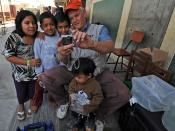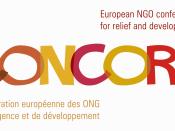ODA is the acronym for Official Development Assistance, otherwise known as aid. Aid is defined as resources transferred on concessional terms with the promotion of economic and welfare of developing countries as the main objective. Theories behind aid and its impact upon development have been both complex and dynamic. In the early decades aid was generally given bilaterally from one government to another in various forms, usually money from donors was invested in large scale state run projects its aim to build infrastructure and fill in the gaps which were considered to constrain development. However by 1980's the criticism was directed at most forms of aid as it was argued it created a culture of dependency in the recipient states, and it created a culture of domination and exploitation of the donor states.
Although there is no universal agreement on what NGO's exactly are there is wide spread appreciation that in contempory society their numbers and influence have reached unprecedented levels.
Today, NGOs address every conceivable issue and they operate in virtually every part of the globe. Many important NGOs, such as those working for human rights and social justice, campaign for broad ideals while others work on an extremely localised scale. At the international level, thousands of organizations are now active. According to one estimate, some 25,000 now qualify as international NGOs and estimated 7 billion dollars is now channelled through these organisations in the form of aid. Non Government organisations have operated at some level throughout history but their role as such a fundamental development agency is a relatively modern phenomenon emerging in the 1980's, but how can such a dramatic increase in influence be accounted for?
Throughout the post war decades, there was a firm idea that the state was the primary agency for development, and this...


